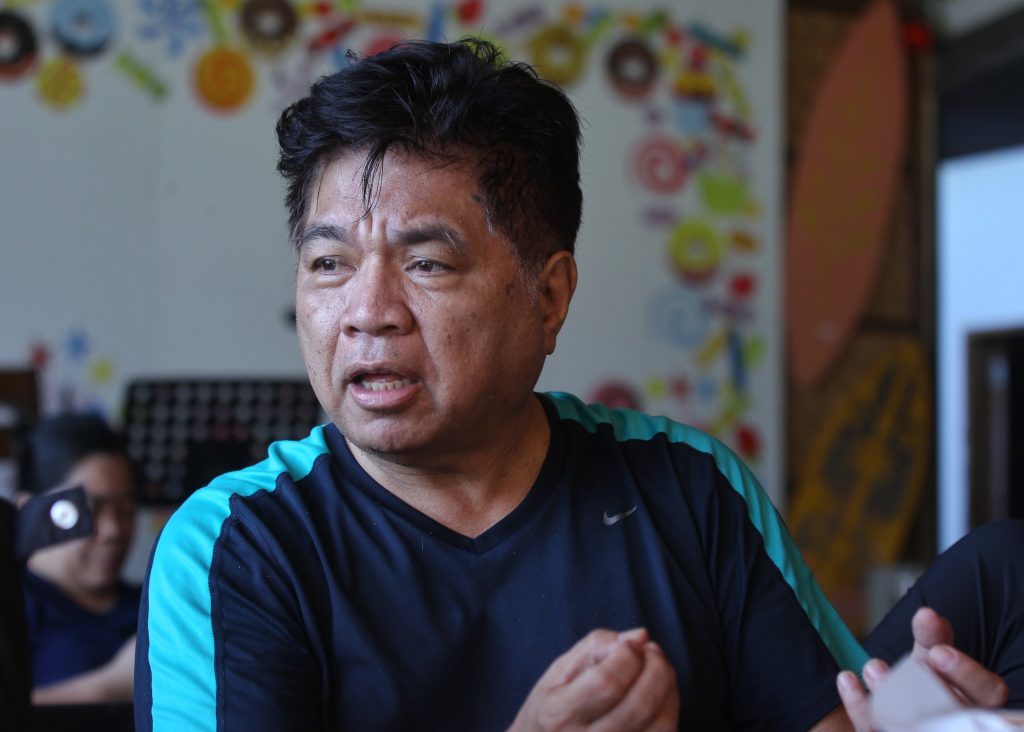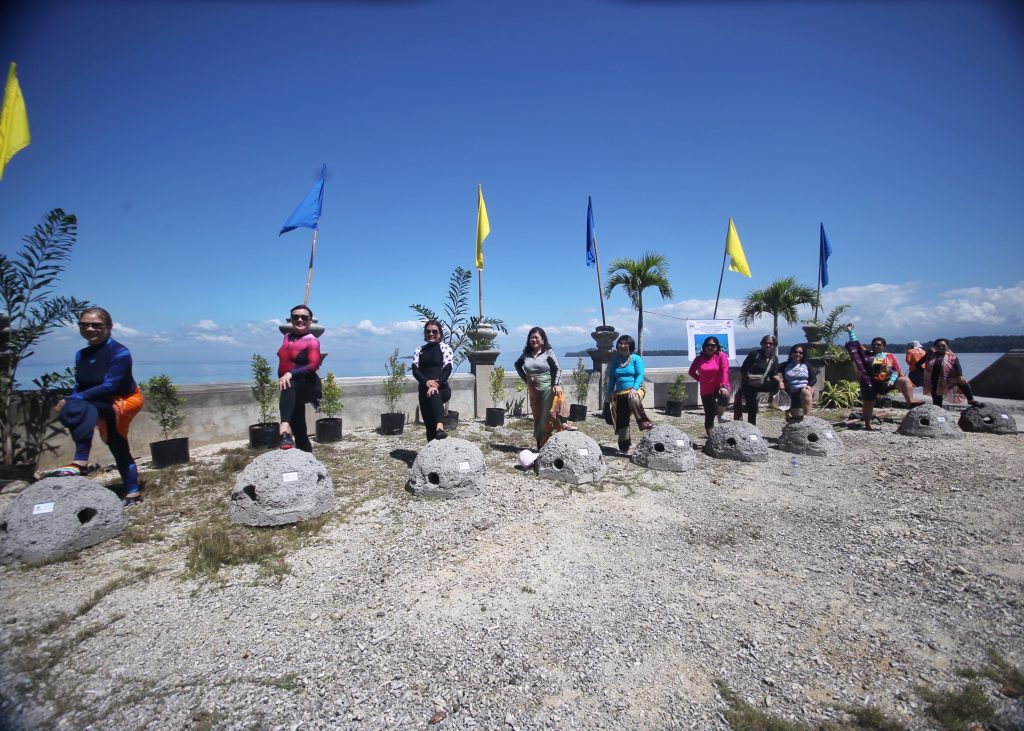
Coral reefs in the Island Garden City of Samal (IGaCoS) have become popular travel destinations for scuba divers and snorkelers because of the variety of fish drawn to them. Not only do coral reefs draw snorkelers and divers, but they also support the highest marine biodiversity and are vital to the people of the island who depend on them for food, jobs and recreation.
So what happens once the corals are dead? The reefs will also die and erode, destroying important marine life spawning and feeding grounds.
Out there in Barangay Balet in Babak District, a new technology called Reefbuds are being planted by the dynamic women of the Innerwheel Clubs of the Philippines Incorporated headed by national president Dr. Amelia V. Jarin to protect and preserve the marine ecosystem of the island.
Reefbuds are made of environmentally-friendly all natural organic structures and inorganic materials forming a biomass that is mixed with ordinary sand and cement to form a rough hollow pyramid structure. These are like solid sponges that absorb sea water up to 30 percent of its weight together with all the marine life suspended in it like spores, plankton, algae, and many more.

These artificial reefs were invented by Benjamin Tayag Jr. based on a concept created by an Austrian geoscientist, the late Dr. Harald Kremnitz. Tayag, who is also a member of the Rotary Club of Paranaque, patented the reefbud and has gone around the world propagating these reefbuds. In May 2006, the technology won a World Bank Country Development Market place contest, one of the 60 grant awardees in a field of over 1,000 proposals on the theme “Development with Equity”.

Last Saturday, the group deployed an initial 13 of the planned 100 reefbuds at the dive site in Brgy. Balet spearheaded by the Innerwheel Club of Paranaque headed by Ann Margaret San Antonio, who is also the national secretary of the Innerwheel Clubs of the Philippines Inc.
“What we promised to IGaCoS Mayor Al David Uy is 100 reefbuds but today initially we have 13 reefbuds to be deployed. Next month we will deploy another batch. This is our first program the 100 reefbuds in the specific location in Balet infront of big Ligid Island,” San Antonio said in an interview.
One of the best features of reefbuds is the speedy growth of marine life. Algae, fishes, sea anemones, squids, sea squirts, sponges, etc. can grow as fast as 4 weeks after being dropped in a marine dead area.
“The basic idea with this, I created a turtle porous rock and when you drop it in the water since it is porous it quickly absorbs water. Kaya yung mga rooting plants grow fast,” Tayag said.
Scientific studies show over 600 percent greater survivability of coral spawn in reefbuds compared to concrete objects, sand, rocks, and coral rubble or dead corals.
“The natural growth of reefbuds during spawning season is six times more than it landed on the rocks. Reefbud is nothing more than a scientific gardening applied on the sea,” he said.
Deploying reefbuds is similar to scientific gardening and farming but applied under the sea. Scientific farming needs continuous activities such as soil preparation, irrigation, planting of seedlings, pest control, harvesting, etc.

Reefbuds need only be deployed and the natural marine ecosystem will generate itself because in every drop of sea water there are thousands of marine creatures such as eggs, larvae, phytoplankton, zooplankton, algae, etc.
When it comes to stability, reefbuds cannot be moved by strong currents during storms as they are built with an aqua dynamic shape that allows currents to simply glide around the structures instead of pushing on them. Stability allows the reefbuds to become permanent homes and spawning grounds for marine life.
To make the project sustainable, the group will monitor the deployed reefbuds through geotagging.
“We put geotag in each of the reefbud and put a nameplate of each company that sponsored the reefbuds so that any time we take a photo of the initial deployment and maybe after two and three months, we will take a photo again to what happen to the reefbuds,” she said.
The group intends to finish deploying all 100 reefbuds on June 30 this year.
“This is a sustaining project dahil kahit sinong uupo ipinagpatuloy niya ang proyekto,” Jarin said.
San Antonio said they chose Balet in particular because it is an adopted barangay of Innerwheel Paranaque since 2013.
“We’ve been supporting Balet and it so happened that last year we met Tayag and we were able to do this in Batangas. The club thought why not do this project in our adopted barangay in Balet to protect the marine life?” she added.
San Antonio said the community will not directly benefit from the project but from the outcome of the project wherein aside from the area becoming a marine sanctuary at the same time it will create another livelihood to the community since the common income of the people in the island is from fishing.
“Yung mga kalalakihan dito sila ang gumagawa ng reefbuds. Yan ang focus natin give livelihood to the community,” she said.
The Innerwheel Parañaque is also providing other livelihood to the 20 women in Balet, the Romblon (leave) banig-making.
“It’s been there for a while but our problem is we need to enhance the technology and quality through TESDA kasi ang quality ng products hindi pa pumapasa sa bigger market hanggang dito pa lang kami sa Samal. At the same time meron kaming sinusuportahan na elementary and day care center and also do annual medical mission here,” she said.
Innerwheel Clubs of the Philippines Inc (IWCPI) belongs to the International Inner Wheel. IWCPI has nine districts all over the Philippines with close to 100 clubs. The women are dynamic leaders bound by friendship and dedicated to selfless service to humanity on health, education, socio-economic, ecology and environment and eco-social projects on different clubs all over the Philippines.
“It is friendship and service in Innerwheel. Sariling gastos namin ito lahat. Wala kaming funding. It is really human service from the heart. Kasi kung wala sa system mo, you cannot do like this. It runs in the system at nasa puso lahat ang aming ginagawa,” Jarin said.




